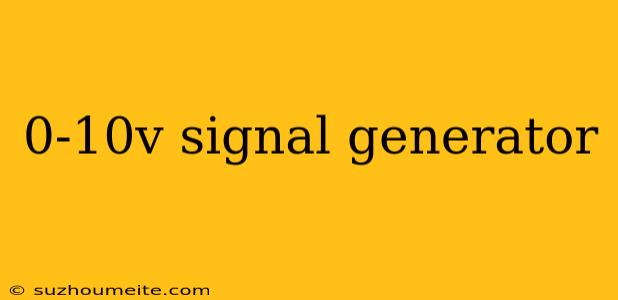0-10V Signal Generator: A Comprehensive Guide
A 0-10V signal generator is an essential tool in various industrial and laboratory settings, used to generate a precise and stable voltage signal within the range of 0 to 10 volts. This device is crucial in testing, calibrating, and troubleshooting analog instruments, sensors, and systems. In this article, we will delve into the world of 0-10V signal generators, exploring their principles, types, applications, and benefits.
Principle of Operation
A 0-10V signal generator works on the principle of converting a stable reference voltage into a precise and adjustable voltage signal within the specified range. The device typically consists of a voltage reference source, an amplifier, and a potentiometer or digital control circuit. The reference voltage is amplified and adjusted to produce the desired output voltage signal.
The output signal can be either a constant voltage or a variable voltage, depending on the type of generator. Some generators may also offer additional features, such as adjustable offset, gain, and frequency.
Types of 0-10V Signal Generators
There are several types of 0-10V signal generators available, each catering to specific requirements and applications:
Analog Signal Generators
Analog signal generators produce a continuous voltage signal within the 0-10V range. These generators are often used in applications where a precise and stable voltage signal is required.
Digital Signal Generators
Digital signal generators produce a digital signal that is converted to a voltage signal within the 0-10V range. These generators offer higher accuracy and resolution than analog generators.
Programmable Signal Generators
Programmable signal generators allow users to set specific voltage levels, steps, and sequences using a digital interface or software. These generators are ideal for complex testing and calibration procedures.
Portable Signal Generators
Portable signal generators are compact and lightweight, making them ideal for field testing and on-site calibration.
Applications of 0-10V Signal Generators
0-10V signal generators have a wide range of applications across various industries, including:
Industrial Automation
0-10V signal generators are used to test and calibrate sensors, transmitters, and control systems in industrial automation applications.
Laboratory Testing
These generators are used in laboratory settings to test and calibrate equipment, such as oscilloscopes, multimeters, and data loggers.
Quality Control
0-10V signal generators are used in quality control processes to test and calibrate measurement instruments and sensors.
Medical Equipment
These generators are used to test and calibrate medical equipment, such as ECG machines and patient monitors.
Benefits of 0-10V Signal Generators
Using a 0-10V signal generator offers several benefits, including:
Precise Voltage Control
0-10V signal generators provide precise and stable voltage control, ensuring accurate testing and calibration.
Flexibility and Versatility
These generators can be used in a wide range of applications and can generate a variety of voltage signals.
Cost-Effective
0-10V signal generators are often more cost-effective than purchasing multiple testing and calibration equipment.
Improved Efficiency
These generators simplify testing and calibration procedures, improving overall efficiency and productivity.
Conclusion
In conclusion, 0-10V signal generators are versatile and essential tools in various industrial and laboratory settings. By understanding the principles, types, and applications of these generators, users can select the right device for their specific needs and benefit from precise voltage control, flexibility, and cost-effectiveness.
